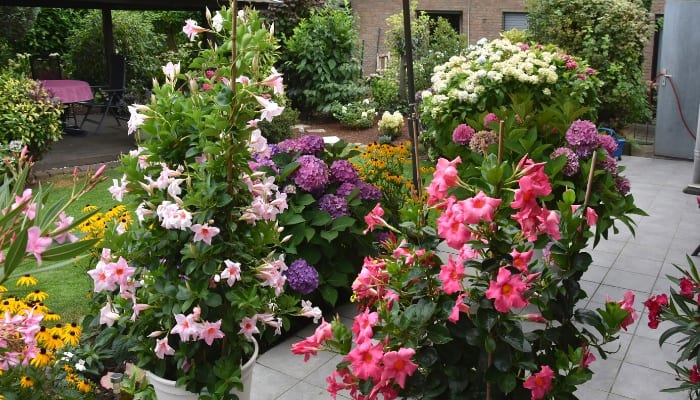The Mandevilla, a tropical plant, is a wonderful choice for any garden. It thrives when planted in the earth or in containers.
As long as it gets plenty of sunlight and the soil is evenly moist, Mandevilla will grow and spread cheer with its bright blooms. The following plants pair well with Mandevilla.
1. Hibiscus
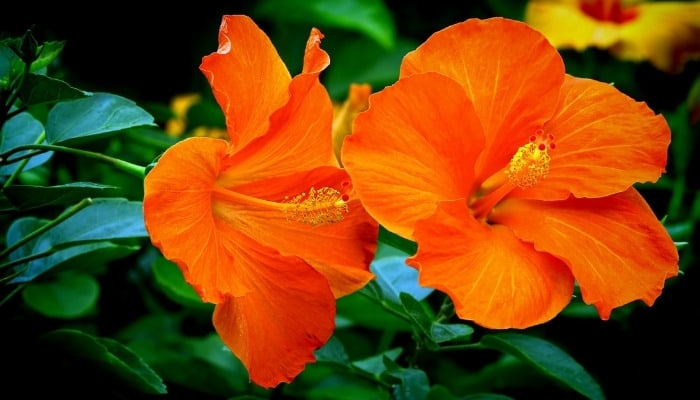
A tropical tree with trumpet-like flowers, this is the ideal backdrop for the Mandevilla. With 200 species to choose from, hibiscus is a versatile plant to grow in Zones 5 to 11. It blooms in the spring and summer.
- Average mature size: 3-10 ft. tall and 2-8 ft. wide
- Growth habit: Tall and upright
- Recommended varieties: Swamp Hibiscus, Confederate Rose, Cajun Cocktail, Perfect Storm
To learn more, here is a comprehensive guide on how to keep your hibiscus blooming.
2. Sweet Alyssum

Sweet alyssum has a short stature, but it does well as a ground cover. The blooms vary in color between white, pink, and purple. Grow it in Zones 5 to 9, and enjoy a colorful blanket around the Mandevilla.
- Average mature size: 3-10 in. tall, 2-4 in. wide
- Growth habit: Groundcover
- Recommended varieties: Easter Bonnet, New Carpet of Snow, Pastel Carpet, Snow Crystals, Snow Princess
3. Calibrachoa

This is a colorful plant in every sense of the word. The blooms that open in the spring and last until the fall come in different colors and patterns ranging from striped, solid, and two-toned.
You should have no trouble finding the perfect matches for Mandevilla from the wide variety of blooms.
- Average mature size: 6-12 in. tall, 12-24 in. wide
- Growth habit: Herbaceous
- Recommended varieties: Cabaret Hot Pink, Cabaret Purple Glow, MiniFamous Double Blue, Kabloom
4. Dipladenia

This is another vine that matches the Mandevilla not just in growing conditions but also in bloom time. It does well grown as an annual in moist and well-draining soil.
- Average mature size: 3-10 ft. tall, 3-4 ft. wide
- Growth habit: Vine
- Recommended varieties: Sanderi, Boliviensis, Laxa
5. Moss Phlox

This is another groundcover plant to carpet your garden or yard that pairs well with Mandevilla. It can grow in places that other plants will find too difficult to grow, such as crevices and rocky soil.
- Average mature size: 6-12 in. tall, 9-18 in. wide
- Growth habit: Low growing and mat forming
- Recommended varieties: Fran’s Purple, Home Fires, Pink Ridge, Sherwood Purple
6. Creeping Thyme
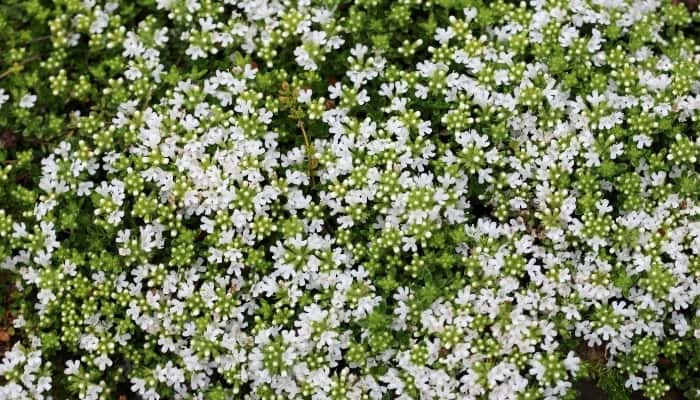
If you prefer a colorful splash to go with Mandevilla, creeping thyme is the perfect match for the vine. It’s a low-growing member of the mint family and gives off a pleasant fragrance.
It’s also tolerant of drought and comes in a wide variety of shapes and colors.
- Average mature size: 2-6 in. tall, 6-18 in. wide
- Growth habit: Ground cover
- Recommended varieties: Spicy orange creeping thyme, white creeping thyme, red creeping thyme, wooly thyme
7. Coral Bells
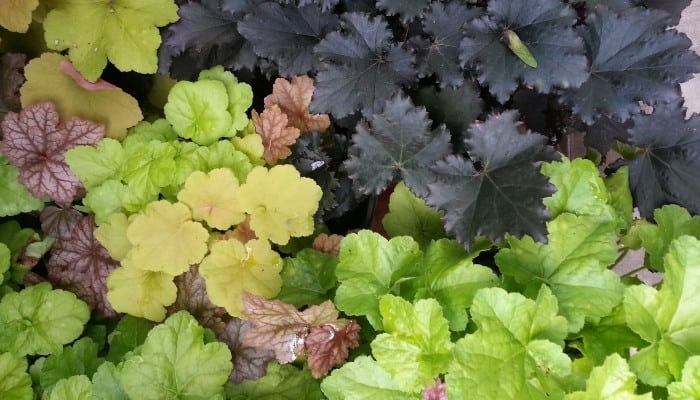
The bell-shaped flowers attract bees and butterflies, and it has well over 200 species to choose from. Some cultivars have leaves in purple, gold, and even rose colors.
It has a moderate growth rate and does well as an ornamental for rock gardens.
- Average mature size: 8-18 in. tall, 12-24 in. wide
- Growth habit: Round mound
- Recommended varieties: Autumn Leaves, Chocolate Ruffles, Green Spice, Marmalade, Citronelle, Electric Lime, Fire Chief
8. Ferns
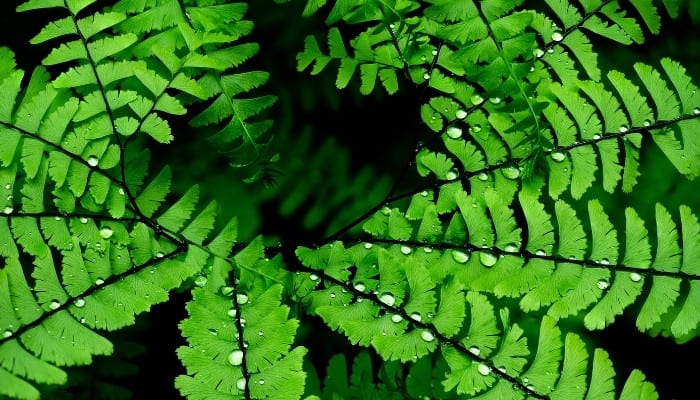
Ferns have been around since the age of the dinosaurs. They give every garden a tropical feel and match well with the Mandevilla vine.
Plant short ferns as ground cover or pair medium-sized ferns with the vine as a lush green backdrop.
- Average mature size: From a few inches to several feet
- Growth habit: Varies depending on species
- Recommended varieties: Southern Maidenhair Fern, Giant Fern, Bird’s Nest Fern, Basket Fern, Hart’s-tongue Fern, Lady Fern, Japanese Painted Fern
9. Verbena
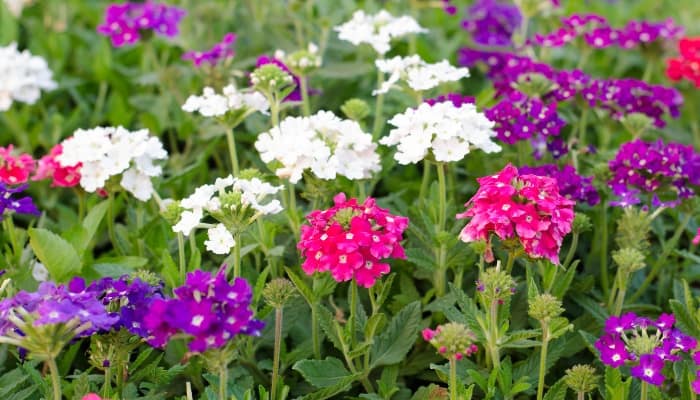
Many cultivars are hardy to Zones 8 to 11 and will grow as perennials. Others can be grown as annuals.
Like ferns, verbena comes in hundreds of varieties with options between ground covers and trailing plants.
- Average mature size: 9-12 in. tall, 12-18 in. wide
- Growth habit: Upright
- Recommended varieties: Lanai Royal Purple With Eye, Lanai Twister Pink, Superbena
10. Portulaca
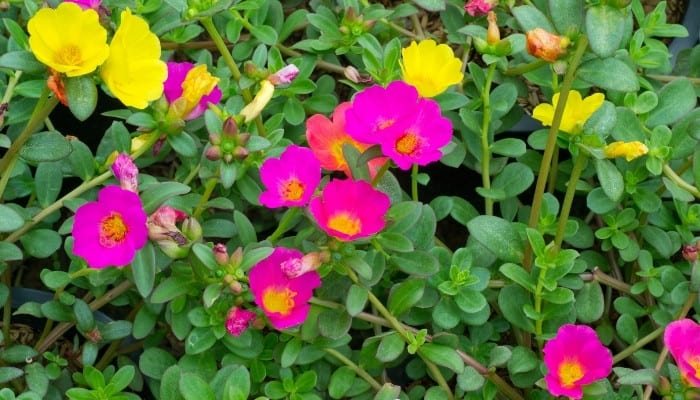
Portulaca plants are succulents that grow low to the ground and provide a colorful mat. The flowers resemble roses, which is a bonus. They only bloom on sunny days.
- Average mature size: 3-8 in. tall, 6-12 in. wide
- Growth habit: Bushy and dense
- Recommended varieties: Afternoon Delight, Calypso Mix, Duet, Fairy Tale, Happy Hour, Mojave, Sundance, Sundial, Tequila, Yubi Summer Joy
11. Dianthus
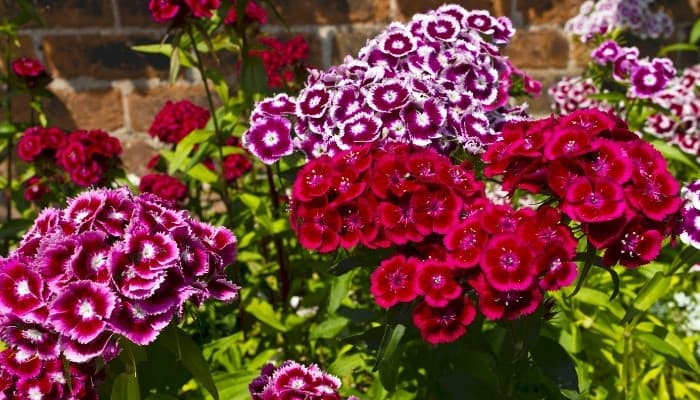
Even without blooms, this showy plant dazzles with its bluish-gray foliage. The grass-like leaves go well with the Mandevilla vine. It’s toxic to animals and grows well in Zones 3 to 9.
- Average mature size: 6-36 in. tall, 6-24 in. wide
- Growth habit: Narrow and grass-like
- Recommended varieties: Arctic Fire, Firewitch, First Love, Rose de Mai
12. Geraniums
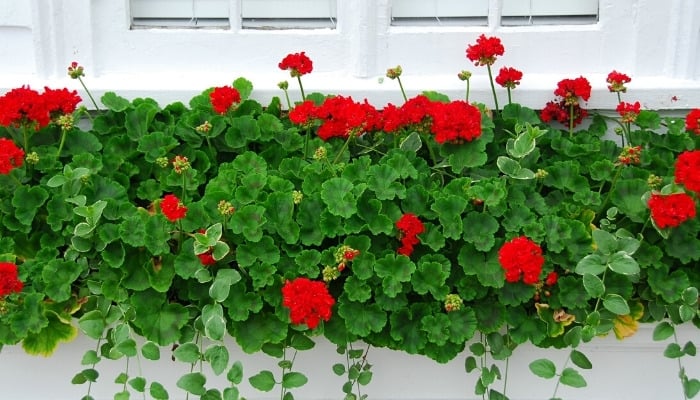
Geraniums are easy to grow and pair well with a wide variety of plants including Mandevilla vines. Plant them in containers, and let them get slightly rootbound for more abundant blooms.
- Average mature size: 5-36 in. tall
- Growth habit: Bushy and dense
- Recommended varieties: Zonal geraniums, ivy geraniums, Interspecific geraniums, Scented-leaf geraniums
13. Marigolds
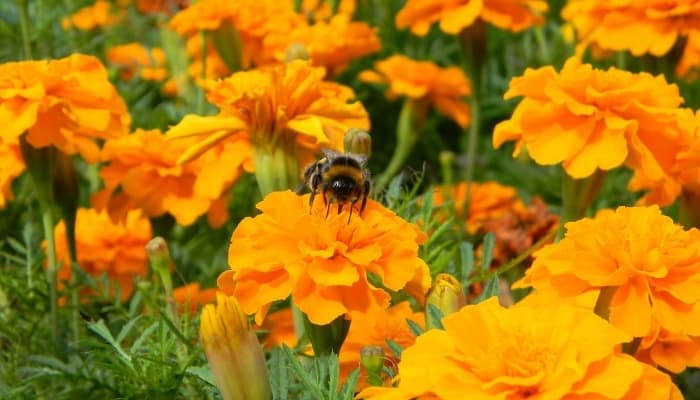
Marigolds grow and mature in a matter of months and start blooming in different shades of yellow, orange, red, and white. They’re annuals and grow in Zones 2 to 11.
- Average mature size: 4-48 in. tall, 6-24 in. wide
- Growth habit: Fern-like foliage
- Recommended varieties: African marigolds, French marigolds, Signet marigolds
14. Coleus
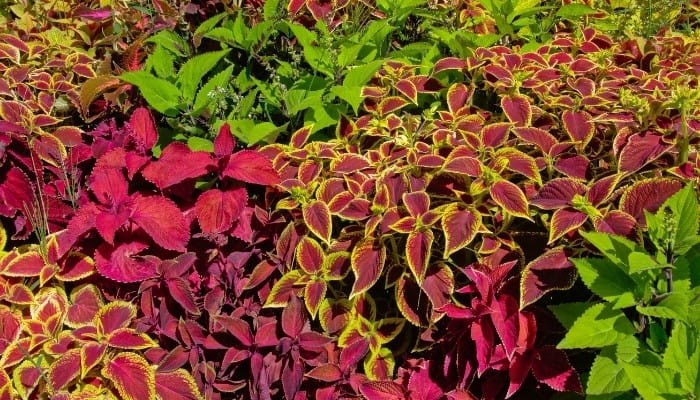
The low-growing coleus serves as an exquisite groundcover with its colorful foliage. It’s only suitable for year-round growing in hot Zones, such as 10 and 11, but it can grow as an annual elsewhere.
It thrives in rich and moist soil.
- Average mature size: 6-36 in. tall and wide
- Growth habit: Quilt-like appearance
- Recommended varieties: Wizard series, Kong series, Black Dragon, Premium Sun series, Fairway series
15. Artemisia
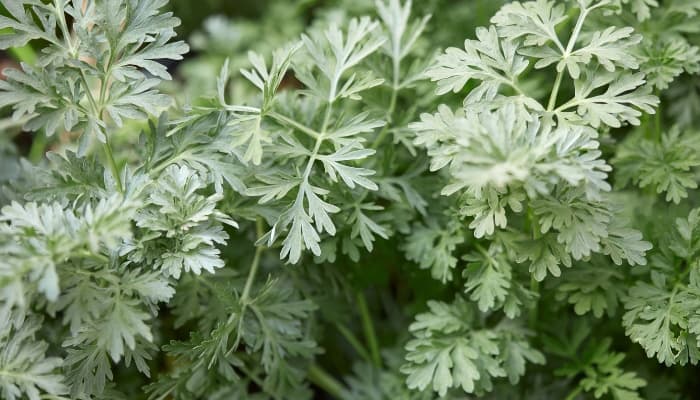
A member of the daisy family, this shrub doesn’t flower much, yet the foliage is silvery, and the leaves are covered with fine hairs. It grows fast and establishes within a few months.
- Average mature size: 1-5 ft. tall, 1-10 ft. wide
- Growth habit: Shrub
- Recommended varieties: Artemisia abrotanum, Canyon Gray, Powis Castle, Silver Queen, Silver Brocade, Seafoam, Silver Mound
16. Neon Pothos
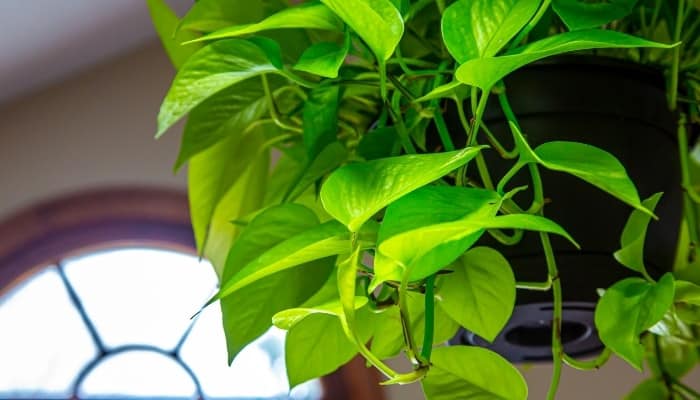
When looking for a showy plant to pair with the equally showy Mandevilla, nothing beats neon pothos, named after the brightly colored leaves that dazzle with their neon-green and heart-shaped appearance.
Native to Australia, it grows naturally in Zones 11 and 12 but can grow in other areas as an annual or as a houseplant.
- Average mature size: 10 ft. long, 3 ft. wide
- Growth habit: Vine
- Recommended varieties: Neon Pothos or any other Pothos variety
17. Sunpatiens
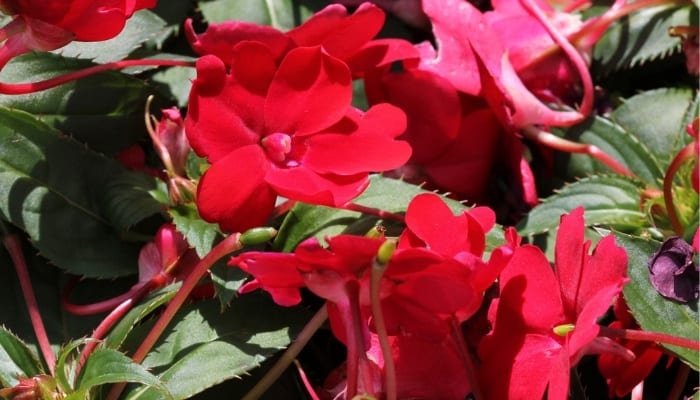
This cultivar can grow in full sun, unlike other impatiens. As annuals, they bloom from the spring until the first frost when they die. Plant them in moist but well-draining soil.
- Average mature size: 16-34 in. tall, 14-21 in. wide
- Growth habit: Large and bushy
- Recommended varieties: Compact SunPatiens, Vigorous SunPatiens
18. Sweet Potato Vine

The long tendrils of the sweet potato vine are one of the best ornamental qualities of this cultivar.
The leaves have unique shapes and vary in color from dark to chartreuse. They rarely flower, but their pretty vining habit makes up for it.
- Average mature size: 8-10 ft. long, 5-12 in. wide
- Growth habit: Fast-growing vine
- Recommended varieties: Sweet Caroline, Margarita, Blackie, Ragtime
19. Lamb’s Ear
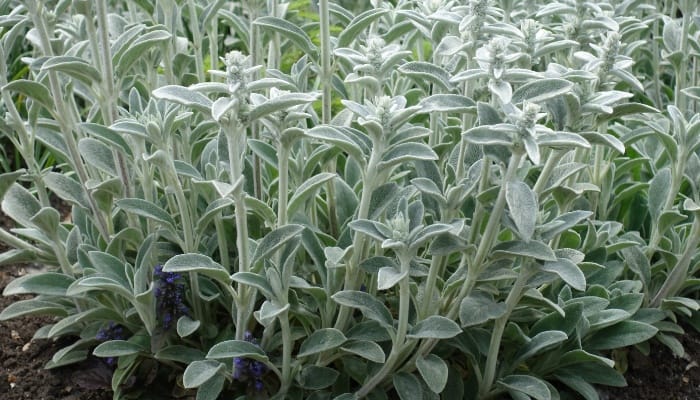
True to its name, lamb’s ear has fuzzy, silvery, and thick foliage that stays low to the ground.
It requires full sun and has a fast growth rate, making them the perfect ground cover in the garden or lawn. It’s deer resistant and grows in Zones 4 to 9.
- Average mature size: 12-18 in. tall, up to 12 in. wide
- Growth habit: Soft-textured mat
- Recommended varieties: Big Ears, Silver Carpet, Cotton Boll
20. Dusty Miller

Silver goes well with bold, bright colors. This is what makes Dusty Miller such a perfect match for Mandevilla.
Dusty Miller grows as a perennial in Zones 8 to 11 but is toxic to people and animals. Plant it in acidic and well-draining soil.
- Average mature size: 1-2 ft. tall, 1-2 ft. wide
- Growth habit: Dense and bushy
- Recommended varieties: Cirrus, Silverado, Silver Lace
Conclusion
Mandevilla vines have the advantage of pairing well with a wide variety of plants — both perennials and annuals. As long as the plant you pair with the vine doesn’t upstage it, then it will do fine.

